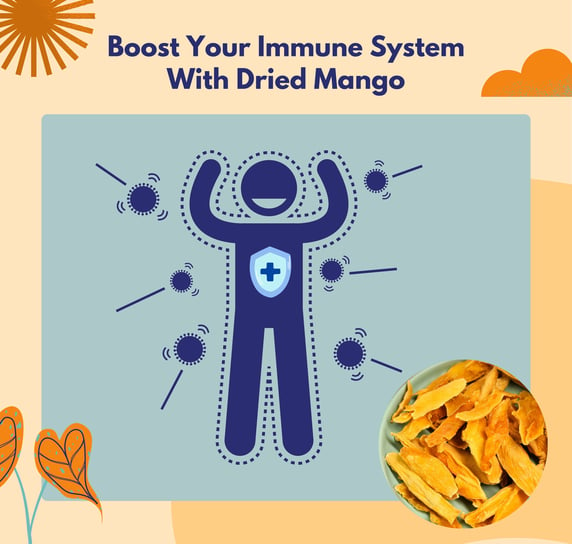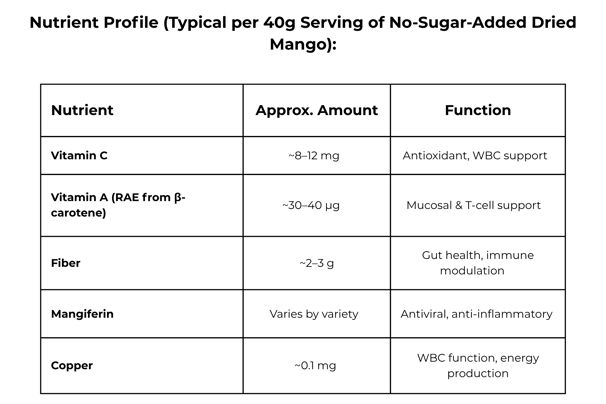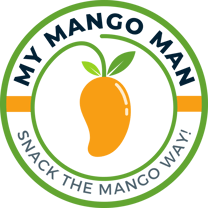Dried Mango: A Delicious Way to Boost Your Immunity


Did you know that your favorite tropical snack is more than just sweet and satisfying? All-natural dried mango is packed with immune-boosting nutrients that help support your body’s natural defenses – no added sugar needed.
Here’s how dried mango helps support immunity:
Rich in Vitamin C
Mangoes are a natural source of Vitamin C, a powerful antioxidant known to strengthen the immune system, promote collagen production, and help your body fight off infections.
Loaded with Antioxidants
Dried mango contains beta-carotene, which the body converts into Vitamin A – crucial for healthy skin, eyes, and immune function. Plus, antioxidants help combat oxidative stress that can weaken your immune response.
Good Source of Fiber
A healthy gut means a stronger immune system. The natural fiber in dried mango supports digestive health and keeps your microbiome balanced – a key part of overall immunity.
Natural Energy Without the Crash
With no added sugar or preservatives, our dried mango provides steady, natural energy – perfect for busy days, travel, or post-workout fuel without the sugar spike.
Immunity Support, The Natural Way
Unlike sugary candies or artificially fortified snacks, our no-sugar-added dried mango delivers real nutrients straight from the fruit – nothing more, nothing less. It’s nature’s way of helping you stay well, one slice at a time.
Technical, science-backed explanation of how dried mangoes especially unsweetened, all-natural dried mango, can function as an immune booster, including key nutrients, mechanisms, and relevant data:
1. Vitamin C (Ascorbic Acid)
Content: While fresh mango contains about 36 mg of Vitamin C per 100g, some of it is lost during drying due to heat sensitivity. Still, dried mango retains a significant amount of Vitamin C per serving, especially if it’s air- or freeze-dried at lower temperatures.
Immune Function:
Stimulates white blood cell production (particularly phagocytes and lymphocytes).
Enhances the function of epithelial barriers (e.g., skin and mucous membranes).
Functions as an antioxidant, protecting immune cells from oxidative stress.
2. Beta-Carotene Vitamin A
Content: Mango is rich in beta-carotene, a carotenoid that gives the fruit its orange-yellow color.
Conversion: Beta-carotene is converted into Vitamin A (retinol) in the body.
Immune Role:
Supports mucosal barrier integrity (lungs, gut lining).
Enhances T-cell function, key for pathogen detection and elimination.
Deficiency is strongly correlated with increased susceptibility to infections.
3. Dietary Fiber
Soluble + Insoluble Fiber: Dried mango provides 2–3g of fiber per 40g serving.
Gut–Immune Axis:
Supports a healthy gut microbiota, which modulates systemic immunity.
Fermentation of fiber in the colon produces short-chain fatty acids (SCFAs) like butyrate, which enhance immune cell function and inflammation control.
4. Polyphenols & Antioxidants
Key Compounds: Mangiferin, quercetin, catechins.
Functions:
Anti-inflammatory and immunomodulatory.
Mangiferin (a xanthonoid found in mango) is studied for:
Inhibiting pro-inflammatory cytokines (e.g., TNF-α, IL-6).
Enhancing macrophage and NK cell activity.
Reducing oxidative damage to immune tissues.
5. Micronutrients
Copper, Folate, Vitamin E (retained in small amounts in dried mango)
Copper aids in the development and maintenance of immune cells.
Folate is essential for DNA synthesis in rapidly dividing immune cells.
Vitamin E provides antioxidant protection and supports T-cell membrane integrity.
Scientific References (Selected):
Carr AC & Maggini S. (2017) – "Vitamin C and Immune Function" (Nutrients)
Zhao, Y. et al. (2013) – "Mangiferin's immunoregulatory effects" (Int. Immunopharmacology)
Belkaid & Hand (2014) – "Role of the microbiota in immunity" (Immunity)Conclusion:
Dried mango, especially in its pure, no-sugar-added form—is a naturally nutrient-dense food that supports the immune system through a combination of:
Antioxidants
Immune-regulatory vitamins
Prebiotic fiber
Bioactive phytochemicals




